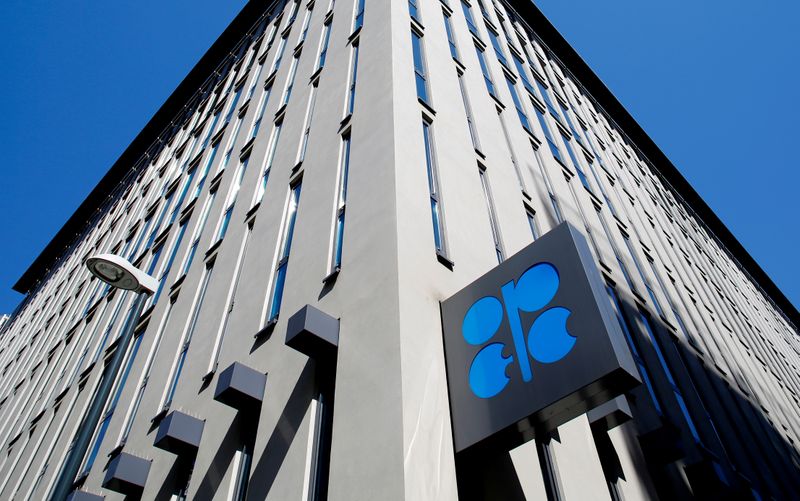By Dmitry Zhdannikov and Bozorgmehr Sharafedin
LONDON (Reuters) - An unprecedented deal by oil producers to curb supply to match demand hollowed out by the coronavirus pandemic is set to depend partly on purchases by consumer countries for their strategic stocks on a scale not before seen.
The Organization of the Petroleum Exporting Countries (OPEC) along with Russia and other producing countries - a grouping known as OPEC+ - partnered with other oil-pumping powerhouses like the United States for an agreement set to remove a total of around 19.5 million barrels per day (bpd) from the market.
Officials and sources from OPEC+ states indicated the International Energy Agency (IEA), the energy watchdog for the world's most industrialised nations, may announce purchases of up to several million bpd to buoy the deal.
But the IEA has never before performed a coordinated stocks purchase and has no effective mandate to do so, said two industry sources familiar with the process.
"It's completely down to individual countries," one of the sources said.
The IEA has in the past announced coordinated stocks releases, like during U.S. hurricane Katrina and the war in Libya. But never purchases.
The IEA said it would publish its monthly report on Wednesday in which it would provide an update on the latest market developments.
Saudi Arabia's energy minister Prince Abdulaziz bin Salman said on Monday that oil purchases into reserves (SPRs) would reach 200 million barrels over the next couple of months, citing the IEA, while three OPEC+ sources said stocks purchases by IEA countries would reach around 3 million bpd in the next couple of months.
The United States - the world's biggest oil producer but an even bigger consumer - along with Japan and South Korea have said they could buy oil to replenish reserves.
The U.S. Energy Department said on Tuesday it is negotiating with nine energy companies to store about 23 million barrels of domestically produced oil in the SPR.
Still, such purchases would seem far short of what some producer countries appear to hope for.
ACTIVELY BUYING
Associate member India said it would fill its SPR by the third week of May by moving about 19 million barrels into the sites.
Another associate member China has made no public comments, although traders have said Beijing has been actively buying oil into strategic stocks in March and April.
Some market watchers believe the purchase estimates floated by OPEC+ officials are ambitious but not strictly impossible.
"The U.S. currently has 78.5 million barrels of spare capacity left in its SPR", Rystad senior oil market analyst Paola Rodriguez-Masiu told Reuters.
"South Korea has some 35 million barrels and Japan about 50 million barrels left, but this is including commercial storage. So, the 200 million barrels figure is feasible, but it will imply that everyone fills tanks to the brim.”
Still, UBS commodities analyst Giovanni Staunovo saw little incentive for developed countries to stock up beyond long-standing agreed levels, noting coordinated stocks purchases would require additional funds at a time of far larger economic problems.

"Each IEA country has the obligation to hold emergency oil stocks (crude and products) equivalent to at least 90 days of net oil imports," Staunovo added. "I am sceptical they will decide to increase those stocks unless it makes sense from a financial perspective."